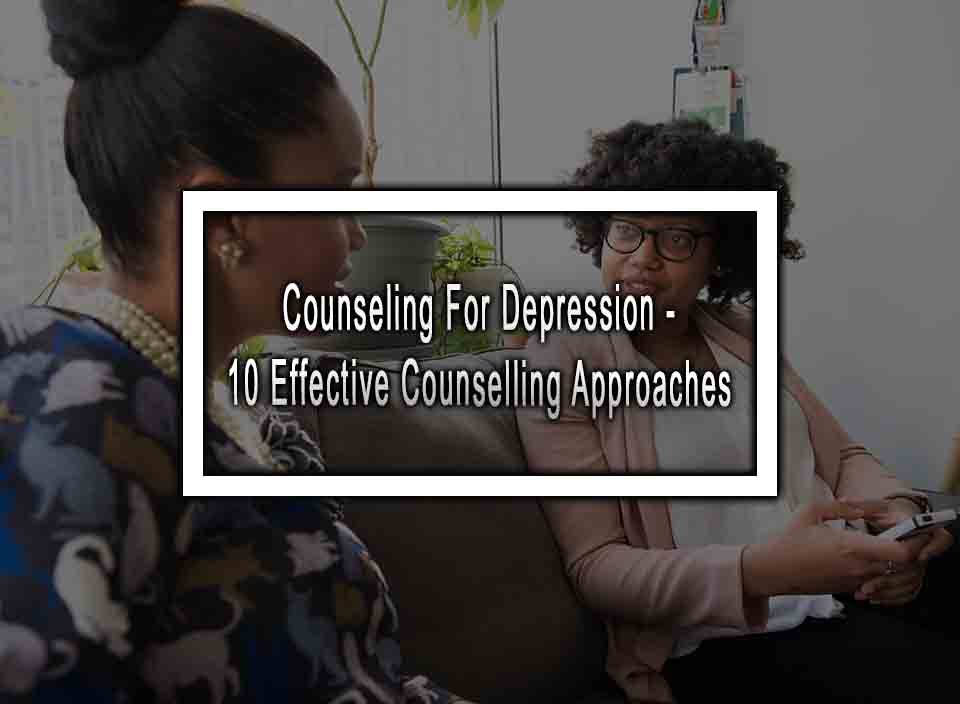Table of Contents
ToggleCounseling for Depression: Seek Counseling to Win Over Depression
Depression is a common mental health condition that affects millions of people worldwide. It can be debilitating and often requires professional intervention. Counseling for depression is one such approach that has proven to be effective in helping individuals regain control over their lives. In this article, we will explore ten evidence-based counseling approaches to tackle depression head-on. So, if you’re ready to let go of the darkness and embrace a brighter future, read on!
1. Cognitive Behavioral Therapy (CBT): Shifting Negative Thought Patterns
CBT aims to identify and challenge negative thinking patterns that contribute to depressive thoughts. This therapy helps individuals replace destructive thoughts with more positive and realistic ones, leading to improved emotional well-being.
2. Interpersonal Therapy (IPT): Enhancing Relationship Dynamics
IPT focuses on examining how interpersonal relationships impact emotional well-being. By addressing relationship conflicts and improving communication skills, individuals can experience relief from depressive symptoms and revive meaningful connections.
3. Psychodynamic Therapy: Unveiling Underlying Emotions
Psychodynamic therapy delves into a person’s past experiences and unconscious beliefs. By exploring hidden feelings and unresolved conflicts, individuals can gain insight into their emotions, fostering personal growth and reducing depressive symptoms.
4. Solution-Focused Brief Therapy (SFBT): Empowering Positive Change
SFBT centers on identifying and amplifying an individual’s existing strengths and resources. By focusing on solutions rather than dwelling on problems, this therapy empowers individuals to create positive changes, ultimately alleviating depression.
5. Mindfulness-Based Cognitive Therapy (MBCT): Cultivating Present-Moment Awareness
MBCT combines elements of CBT with mindfulness practices. By cultivating present-moment awareness, individuals can break free from repetitive negative thoughts and foster self-compassion, resulting in reduced depressive symptoms.
6. Art Therapy: Expressing Emotions Creatively
Art therapy provides a non-verbal outlet for individuals to express their emotions, promoting self-exploration and healing. Engaging in creative activities can offer a sense of empowerment and contribute to improved mental well-being.
7. Acceptance and Commitment Therapy (ACT): Embracing the Present Moment
ACT combines mindfulness and acceptance strategies to develop psychological flexibility. By learning to accept uncomfortable thoughts and feelings, individuals can focus on meaningful actions and enhance their overall quality of life.
8. Narrative Therapy: Rewriting Your Story
Narrative therapy helps individuals examine the stories they tell themselves about their lives. By challenging negative narratives and reframing experiences, individuals can gain a sense of agency and hope, reducing the impact of depression.
9. Dialectical Behavior Therapy (DBT): Promoting Emotional Regulation
Dialectical Behavior Therapy aims to help individuals develop skills for emotional regulation, distress tolerance, and interpersonal effectiveness. By learning healthy coping strategies, individuals can navigate their emotions more effectively, leading to improved mental well-being.
10. Group Therapy: Sharing Experiences and Building Support Networks
Group therapy provides a supportive environment where individuals can share their experiences, gain insights, and build connections. By connecting with others who understand their struggles, individuals can find solace and motivation for their journey toward depression recovery.
Conclusion
Depression can cast a dark cloud over one’s life, but counseling offers a guiding light toward healing and renewal. Remember, seeking support is an act of courage. Whether it’s cognitive behavioral therapy, art therapy, or any of the therapeutic approaches discussed, taking the first step towards counseling can empower individuals to break free from the clutches of depression and rediscover inner peace. Embrace the possibilities that lie ahead – a brighter, happier future awaits.
Counseling For Depression FAQ
Here are the most common questions about counseling for depression.
1. Who can benefit from counseling for depression?
Counseling for depression can benefit anyone experiencing symptoms of depression, such as persistent sadness, loss of interest in activities, changes in appetite or sleep, low energy, feelings of guilt or worthlessness, difficulty concentrating, or thoughts of self-harm. It can be helpful for individuals with mild to moderate depression, as well as those with more severe forms of the condition.
2. How long does counseling for depression last?
The duration of counseling for depression can vary depending on the individual and their specific needs. Some people may find relief after a few sessions, while others may require longer-term therapy. It is common for therapy to continue for several months to a year, although this can be adjusted based on progress and individual circumstances.
3. Is counseling for depression effective?
Numerous studies have shown that counseling, particularly evidence-based approaches like CBT and IPT, can be highly effective in treating depression. Research suggests that therapy can lead to significant improvements in depressive symptoms, overall well-being, and quality of life. However, it is important to note that individual outcomes may vary.
4. Can counseling for depression be combined with medications?
Yes, counseling for depression can be combined with medication. In fact, a combination of therapy and antidepressant medication is often considered the most effective treatment approach for moderate to severe depression. A mental health professional or psychiatrist can work collaboratively with individuals to determine the most appropriate treatment plan, which might involve both therapy and pharmacological interventions.
5. Is counseling for depression confidential?
Yes, counseling for depression is typically confidential. Mental health professionals adhere to strict ethical guidelines and laws regarding client confidentiality. However, there are some exceptions to confidentiality, such as when there is a risk of harm to oneself or others, child abuse concerns, or legal obligations. It is important to discuss confidentiality with your therapist to ensure you fully understand the limits and protections of confidentiality in your specific situation.












